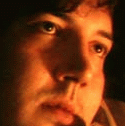|
|
| Miranda Mowbray is a soprano mathematician. She was born in London, and studied music and political philosophy in the USA and algebra in Britain. Her passions include brazilian music, dodecahedra, Naples, mango icecream, and talking late into the night. Some of her postcards can be found here. |
|
|
| Walter Aprile was born in Parma in 1971. He worked on automatic translation at CMU in Pittsburgh, thus avoiding Italian military service. He reads quite a lot. His passions include ancient music, linguistic deconstruction, Monty Python, Borges, and vitello tonnato. He hates milanese football, intellectual dishonesty and badly made coffee. |
And How Far Away?
.
.
|
A nd how far away are you?
A s the crow flies, thousands of miles - it will be a wingtorn and
heartbroken crow by the time it arrives; by sea, a week
of
deck-quoits, time enough to watch the flowering and
fading of
shipboard romances; by the red-eye plane, a sleepless
night.
A nd via Cyberia, minutes.
|
C ybergravity has warped our space, rolling us towards
eachother like
two bodies on a sprung mattress.
C adging a lift on this electronic eagle that outflies
the sun, I come
to you - here I am on your screen now.
T ake me in your arms.
|
T hat's not possible, I know.
C yberia is cold and lonely - I can't see anyone, hear
anyone, touch
anyone, there's just a blackness out of which
floats a stream of
ASCII characters; no inflection, no pitch.
T he only facial expressions I can receive are those
given by a
semicolon, a dash and a bracket.
|
C an you even tell it's me talking to you, and not an
automatic mailer
or a consortium of monkeys?
G iven that my words are shorn of voice, expression,
tone, emphasis,
and their naked shivering cores are sped by electronics,
magnetics,
radio, and light through fiber, through space,
through air, through
wire, through brain-circuitry to be reclothed
by you, how can I ensure
that the speaker that you reconstruct will be
me?
C yberspaciousness, the gap between us unbridgeable by
any message,
no matter how fast it travels.
|
T hat evening when we were close enough to touch but
I didn't dare,
it's like that.
A s I couldn't possibly look at your face, I turned my
gaze from your
profile to your hand, but it was too full of the
essence of you,
too expressive and particular to bear, so I looked
instead at your
elbow, that most prosaic part of the body, at
the radius and the
ulna, the marks of your life in the roughened
patch, the line where
your tan became paler and your skin more delicate,
the leaping pale
blue arc of a vein, the inverted V at the end
of your short-sleeved
shirt, the fine hairs on the golden skin revealed
in the V as you
turned away -
C yberspace brings me as close to you, and as far from
you, as I
was on that evening.
|
C an I do what I long to do, send you myself in an email?
G eneticists say, after all, that I am nothing but a
message of
three-letter words written with a four-symbol
alphabet - ademine,
guanine, cytosine, thymine - each word encoding
an amino acid in my
DNA, ...AAA-CCT-TTC-CGC-.. and so on; so can I
encode myself
into ASCII, send myself to your terminal and step
out of the screen
into your embrace?
C an I send you some message which expresses the essence
of me, just
as the movement of your hand that evening spoke
of your whole
personality - some message that will survive the
abstractions and
distortions of cybertravel - or must I wait until
I can fly a red-eye
or deck-quoit or crow's wing to touch once again
the skin hidden by
your sleeve, and read the secret message encoded
in your body's
braille?
|
T he geneticists themselves, though, admit that the genetic
coding
is but the seed of a human being or of any form
of life - it contains
the design of your veins, but it cannot anticipate
the wear of life
or the minute creasings that your movements will
create.
C learly I can't send all of myself; too much information
in too little
bandwidth - it would take years, long years of
net time, endless years
of bits of me flying, swimming, burning through
the Ocean that separates
us.
A ll of myself I cannot send; I will send a nucleus,
an egg. You will
incubate it in your fertile mind, and what can
I do but hope that the
unpredictable chimera that egg will spawn resembles
what I wanted ?
|
C onversely: consider it as a nucleus of a crystal, and
you will build
upon it layer after layer of crystalline growth,
feeding it with the
messages I will send afterwards.
C learly this is not the last one, right ?
G rant me that you listen to this long string of nucleotides,
to this
transatlantic line of babbling, and coil it into
your chambers, to do
what mad scientists do (I know, this is not tasteful,
but we have just
a minimal etiquette here, darling).
|
.
.
